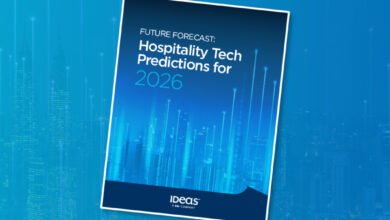IDeaS 2026 Forecast: AI, Unified Strategies & Workforce Trends

▼ Summary
– IDeaS has released its annual eBook “Future Forecast: Hospitality Tech Predictions for 2026,” featuring data-driven insights from hoteliers and tech leaders.
– The report identifies a need to simplify fragmented technology systems, with only 54% of hoteliers currently using mostly integrated tools.
– 89% of hoteliers plan new AI applications, advancing the “augmented hotelier” through chatbots, mobile check-in, and intelligent assistants.
– Future-ready hotels will align sales, marketing, and revenue management teams around unified data to improve segmentation and market response.
– The eBook outlines strategies to integrate sustainability with profitability and invest in automation and workforce development for operational resilience.
Navigating the hospitality industry’s future requires a clear understanding of emerging technologies and strategic shifts. IDeaS, a SAS company renowned for its revenue management leadership, has published its annual eBook titled Future Forecast: Hospitality Tech Predictions for 2026. This comprehensive report compiles exclusive survey data from hoteliers and technology partners, offering actionable insights to help industry leaders simplify operations, accelerate artificial intelligence adoption, and construct resilient organizations prepared for upcoming challenges.
The eBook addresses how hotels can manage growing complexity, economic fluctuations, and rapid technological change. It identifies several transformative trends expected to redefine hospitality by 2026, focusing on the need for simplification and unification of fragmented technology systems, the merging of commercial approaches across revenue, marketing, and sales functions, and the pursuit of more durable and environmentally conscious operational practices.
Key findings from the report highlight critical areas for development. A major focus is on technology simplification, where both hotel operators and tech providers recognize that streamlining systems and creating cohesive strategies have become essential for staying competitive. However, a significant gap remains, as only 54% of hoteliers indicate they primarily use integrated tools, pointing to an urgent need for improvement.
Artificial intelligence is set to revolutionize daily hotel operations. With an overwhelming 89% of hoteliers preparing to implement new AI applications, the concept of the “augmented hotelier” is quickly materializing. This shift includes the adoption of chatbots, mobile check-in services, and intelligent assistants that enhance decision-making processes and guest interactions.
Another pivotal trend is the formation of unified commercial teams. Hotels aiming for future readiness are expected to synchronize their sales, marketing, and revenue management departments around a single, reliable data source. This alignment promotes more precise customer segmentation, improved channel optimization, and quicker responses to market dynamics.
Sustainability and operational resilience also feature prominently in the analysis. Although environmental responsibility is frequently cited as a goal, many establishments still treat it as a secondary concern. The report proposes practical methods for hotels to merge eco-efficiency with financial performance, utilizing advanced forecasting, resource optimization, and flexible operational frameworks.
Workforce stability remains a top investment priority. Hotels are increasingly turning to automation, employee upskilling, and cross-training initiatives to maintain operational consistency and attract high-caliber talent in a competitive labor market.
The eBook incorporates expert commentary from notable figures in the hospitality and technology sectors, including Clément Dénarié of Oaky, Katie Moro from Amadeus Hospitality, Mercedes Minghelli representing TrustYou, and Werner Meyer of Busyrooms.
Klaus Kohlmayr, Chief Evangelist & Development Officer at IDeaS, emphasized the industry’s current turning point. He stated that technology, AI, and unified strategies are creating unprecedented operational possibilities. The objective is not to replace human staff but to equip them with tools that reduce complexity, speed up innovation, and enable the delivery of outstanding guest experiences that support both profitability and sustainability. IDeaS is dedicated to assisting hoteliers in converting industry disruptions into tangible opportunities.
Future Forecast: Hospitality Tech Predictions for 2026 serves as a strategic guide for innovation, adaptation, and expansion. By adopting the insights and predictions within, hospitality leaders can enhance guest satisfaction, strengthen commercial outcomes, and ensure their organizations prosper amid increasing complexity.
The complete Future Forecast: Hospitality Tech Predictions for 2026 eBook is available for download.
(Source: ITWire Australia)





